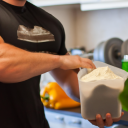

When we think of bodybuilders, we often envision individuals with bulging muscles, sculpted physiques, and incredible strength. They are admired for their dedication and discipline in achieving such impressive physical transformations. However, as with any extreme sport or activity, there are questions about the potential health risks involved. In this article, we will delve into the science behind bodybuilding and explore the impact it may have on an individual's overall health.

Bodybuilding involves intense resistance training combined with strict nutrition and supplementation regimens. The goal is to increase muscle mass while reducing body fat to achieve a lean and muscular physique. This requires hours of dedicated training, often six days a week, with a focus on specific muscle groups and progressive overload.
Bodybuilders follow carefully calculated diets, which typically involve high protein consumption to support muscle growth and repair. They may also use supplements such as protein powders, creatine, and amino acids to enhance their performance and recovery. Additionally, bodybuilders often engage in cardiovascular exercise to maintain cardiovascular health and improve overall conditioning.

Despite the intense demands, bodybuilding can have numerous positive effects on an individual's health. Regular exercise, such as resistance training, has been shown to improve cardiovascular health, increase bone density, and enhance overall strength and endurance.
Bodybuilding can also promote better body composition, leading to a reduction in body fat and an increase in lean muscle mass. This can have a positive impact on metabolic health, as muscle is more metabolically active than fat, resulting in improved insulin sensitivity and a reduced risk of chronic diseases such as diabetes and obesity.
Furthermore, bodybuilding can positively influence mental health by boosting self-confidence, improving body image, and reducing symptoms of anxiety and depression. The discipline and dedication required in bodybuilding can also translate into other areas of life, fostering self-discipline, goal-setting, and perseverance.

While bodybuilding offers numerous health benefits, it is important to acknowledge and address the potential risks associated with this sport. One common concern is the use of anabolic steroids and other performance-enhancing substances. These substances can have serious health consequences, including liver damage, cardiovascular problems, hormonal imbalances, and psychological effects.
Another risk worth considering is the potential for overtraining and injuries. Bodybuilders often push their bodies to the limit, which can lead to overuse injuries, muscle imbalances, and joint problems. It is crucial to prioritize proper form, rest, and recovery to avoid these issues.

To ensure the long-term health and well-being of bodybuilders, it is essential to strike a balance between intense training and adequate recovery. Periodization, which involves alternating between periods of high-intensity training and lower-intensity recovery, can help prevent overtraining and optimize performance.
In addition, bodybuilders should prioritize a well-rounded nutrition plan that includes a variety of nutrient-dense foods to support overall health and prevent nutrient deficiencies. Regular health check-ups, including blood work and monitoring hormone levels, can also provide valuable insights into an individual's well-being.

Bodybuilding is a demanding sport that requires dedication, discipline, and careful attention to both training and nutrition. When approached responsibly, bodybuilding can have a positive impact on an individual's physical and mental health. However, it is important to be aware of and address the potential risks associated with this sport, such as the use of performance-enhancing substances and the risk of overtraining and injuries. Striking a balance between intense training, proper nutrition, and adequate recovery is key to maintaining long-term health in the world of bodybuilding.